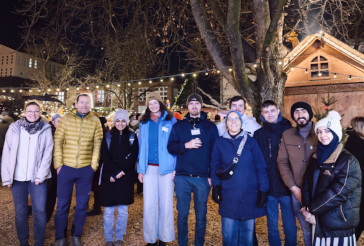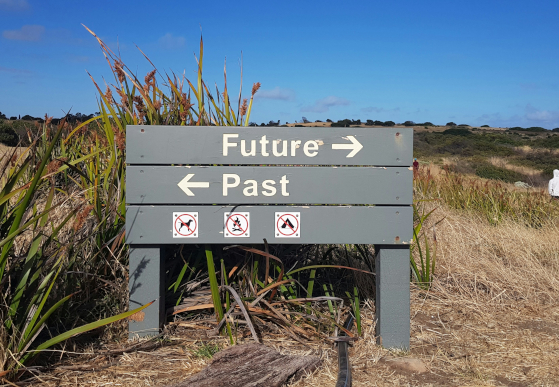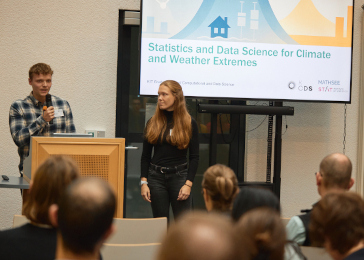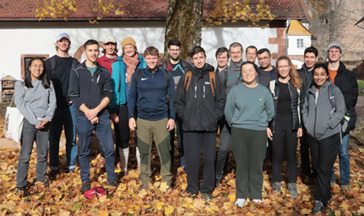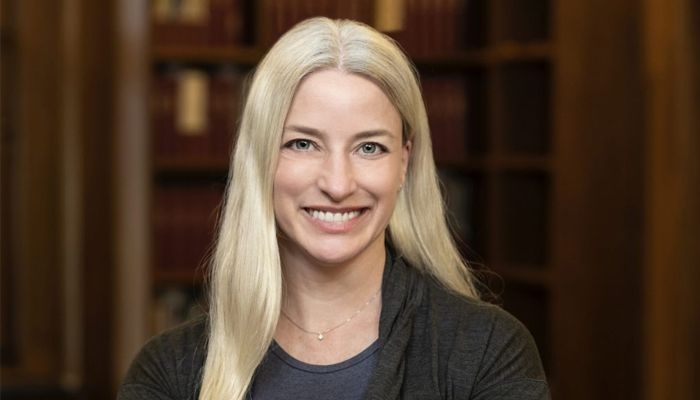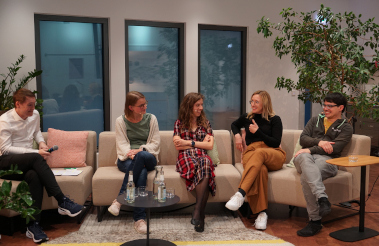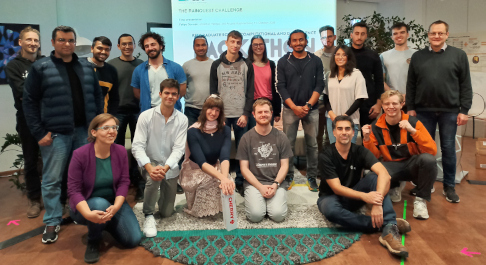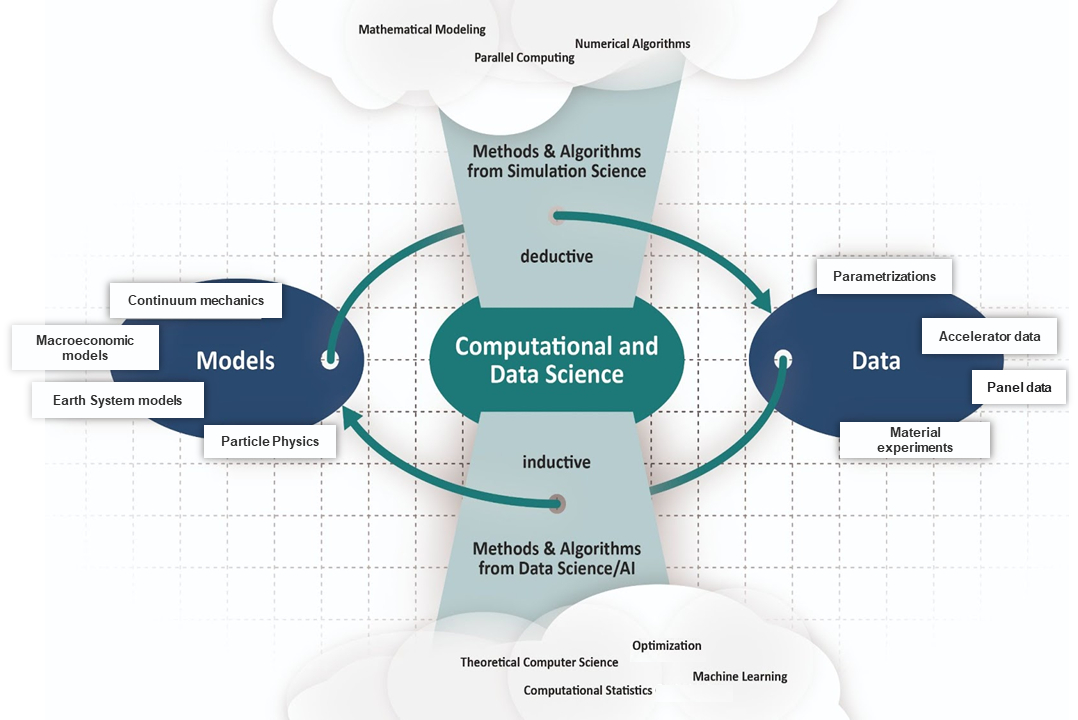InformatiKOM I
Geb. 50.19, Adenauerring 12
…
, KIT-Fakultät für Informatik
The KIT Department of Informatics cordially invites you to the Semester Colloquium on February 16 2026, 5:30pm, at InformatiKOM 1.
As part of the event, the Dean of the Faculty will give a brief semester report, providing an overview of current developments and perspectives. The focus of the colloquium will then be on the inaugural lectures of Professor Nadja Klein and Professor Henning Meyerhenke, both of whom are based at the Scientific Computing Center in addition to the Department.
In her inaugural lecture, entitled “Bayesian Statistics and Machine Learning: Leveraging the Best of Both Worlds”, Nadja Klein introduces Bayesian learning as a principled framework for combining prior knowledge with data, quantifying uncertainty, and enhancing the transparency of modern machine-learning systems. By incorporating expert information, structural assumptions, or sparsity‑inducing mechanisms, Bayesian methods can make models more accurate, robust, and data‑efficient, thereby addressing key limitations of black‑box approaches. Nadja Klein's research brings together theoretical analysis, methodological innovation, and real‑world applications. This includes work on spatial statistics, sparse and scalable Bayesian models, Bayesian neural networks, and techniques for interpretability and explainability of complex systems. On the applied side, her group collaborates across disciplines, from analyzing complex biomedical and neuroimaging data, to predicting weather and environmental patterns, to supporting safer autonomous‑driving technologies. This talk will highlight selected recent methodological advances from her group and illustrate their impact through concrete applications, showcasing how Bayesian ideas can strengthen modern machine‑learning pipelines.
In the inaugural lecture “Graph Algorithms for Large Complex Systems” Henning Meyerhenke addresses research challenges arising from massive networks in different application areas. The talk focuses on recent algorithmic results that solve problems in algorithmic network analysis, carbon-aware workflow scheduling, and graph robustness optimization.
Following the colloquium, you are warmly invited to a small reception, offering the opportunity for discussion and personal exchange.
KIT, Campus South
20.30 SR 3.060
…
Melanie Moosbuchner, Silke Hell
Two-day interactive on-site workshop (March 5+6, 2026)
Only few PhD graduates stay at the university in the medium term and the most optimistic estimates give only 10 % of PhDs a realistic chance of attaining a professorship. Therefore, it is very wise for scientists to start exploring alternative career paths early on. Several obstacles stand in the way: the intense focus on the dissertation and the resulting lack of time, doubts and fears about career prospects both inside and outside academia, and the shortage of concrete strategies and role models.
This workshop offer is intended to give doctoral candidates and postdocs the opportunity to deal specifically with the topic of possible career prospects outside of their academic career – be it to have a good "plan B", be it to concretize perspectives and take their first steps.
Note: This workshop is primarily aimed at the German‑speaking job market. Please consider our other workshop offer in April for the international job market.
The workshop is offered exclusively for KCDS members and members of the CRC Wave Phenomena. If there are free places left over, non-members may also sign up. Registration for non-members will open on February 1, 2026.
Registration
Please visit the KCDS intranet portal to register for this course.
For non-members of KCDS:
In order to sign up for this course, a KCDS guest/non-member account is necessary.
If you don't have an account yet, you can register here: Create a KCDS account to book courses
Once your account is activated by a KCDS administrator, you will be able to book the course.
KIT, Campus South
20.30 SR 3.060
…
Melanie Moosbuchner, Silke Hell
Two-day interactive on-site workshop (March 5+6, 2026)
Only few PhD graduates stay at the university in the medium term and the most optimistic estimates give only 10 % of PhDs a realistic chance of attaining a professorship. Therefore, it is very wise for scientists to start exploring alternative career paths early on. Several obstacles stand in the way: the intense focus on the dissertation and the resulting lack of time, doubts and fears about career prospects both inside and outside academia, and the shortage of concrete strategies and role models.
This workshop offer is intended to give doctoral candidates and postdocs the opportunity to deal specifically with the topic of possible career prospects outside of their academic career – be it to have a good "plan B", be it to concretize perspectives and take their first steps.
Note: This workshop is primarily aimed at the German‑speaking job market. Please consider our other workshop offer in April for the international job market.
The workshop is offered exclusively for KCDS members and members of the CRC Wave Phenomena. If there are free places left over, non-members may also sign up. Registration for non-members will open on February 1, 2026.
Registration
Please visit the KCDS intranet portal to register for this course.
For non-members of KCDS:
In order to sign up for this course, a KCDS guest/non-member account is necessary.
If you don't have an account yet, you can register here: Create a KCDS account to book courses
Once your account is activated by a KCDS administrator, you will be able to book the course.
Uni Heidelberg: Mathematikon, Im Neuenheimer Feld 205 (INF 205), 69120 Heidelberg
Lukas Trottner, Andrea Barth, Markus Reiß, Oana Lang and more tbd
We are happy to announce the Junior Researcher Workshop on stochastic partial differential equations in applied mathematics. The workshop is a joint initiative by doctoral students from Karlsruhe's KCDS and Heidelberg's HGS MathComp and aims to provide young researchers with a smooth introduction to this challenging yet highly relevant topic.
Registration is now open and poster contributions are very welcome!
Abstract
Stochastic partial differential equations (SPDEs) are a notoriously challenging topic in combining advanced theory of both partial differential equations and stochastic processes. However, it is due to this sophisticated combination of both concepts that they emerge as a powerful and versatile tool for modelling highly diverse phenomena in the sciences. While incredibly useful to describe these systems, utilising them jointly with data and measurements to accurately determine characteristics or provide reliable predictions is still a lot of work in progress in (applied) mathematics.
A central challenge, especially for junior researchers with an interest in the field, is that there is a major gap to overcome from available lecture materials, graduate courses and books to current problems and challenges in applied mathematics for SPDEs. We aim to support doctoral students in closing this gap, growing a network of junior researchers and fostering interdisciplinary collaboration.
More info and registration:
Pathways into Mathematics of SPDEs: A Workshop for Young Researchers
The workshop is organized jointly by doctoral researchers of the graduate schools KCDS (Karlsruhe) and HGS MathComp (Heidelberg), with financial and organizational support from: HGS MathComp, KCDS, HIDA, SIAM & GAMM Student Chapter Heidelberg, STRUCTURES, and HEiKA
Uni Heidelberg: Mathematikon, Im Neuenheimer Feld 205 (INF 205), 69120 Heidelberg
Lukas Trottner, Andrea Barth, Markus Reiß, Oana Lang and more tbd
We are happy to announce the Junior Researcher Workshop on stochastic partial differential equations in applied mathematics. The workshop is a joint initiative by doctoral students from Karlsruhe's KCDS and Heidelberg's HGS MathComp and aims to provide young researchers with a smooth introduction to this challenging yet highly relevant topic.
Registration is now open and poster contributions are very welcome!
Abstract
Stochastic partial differential equations (SPDEs) are a notoriously challenging topic in combining advanced theory of both partial differential equations and stochastic processes. However, it is due to this sophisticated combination of both concepts that they emerge as a powerful and versatile tool for modelling highly diverse phenomena in the sciences. While incredibly useful to describe these systems, utilising them jointly with data and measurements to accurately determine characteristics or provide reliable predictions is still a lot of work in progress in (applied) mathematics.
A central challenge, especially for junior researchers with an interest in the field, is that there is a major gap to overcome from available lecture materials, graduate courses and books to current problems and challenges in applied mathematics for SPDEs. We aim to support doctoral students in closing this gap, growing a network of junior researchers and fostering interdisciplinary collaboration.
More info and registration:
Pathways into Mathematics of SPDEs: A Workshop for Young Researchers
The workshop is organized jointly by doctoral researchers of the graduate schools KCDS (Karlsruhe) and HGS MathComp (Heidelberg), with financial and organizational support from: HGS MathComp, KCDS, HIDA, SIAM & GAMM Student Chapter Heidelberg, STRUCTURES, and HEiKA
Uni Heidelberg: Mathematikon, Im Neuenheimer Feld 205 (INF 205), 69120 Heidelberg
Lukas Trottner, Andrea Barth, Markus Reiß, Oana Lang and more tbd
We are happy to announce the Junior Researcher Workshop on stochastic partial differential equations in applied mathematics. The workshop is a joint initiative by doctoral students from Karlsruhe's KCDS and Heidelberg's HGS MathComp and aims to provide young researchers with a smooth introduction to this challenging yet highly relevant topic.
Registration is now open and poster contributions are very welcome!
Abstract
Stochastic partial differential equations (SPDEs) are a notoriously challenging topic in combining advanced theory of both partial differential equations and stochastic processes. However, it is due to this sophisticated combination of both concepts that they emerge as a powerful and versatile tool for modelling highly diverse phenomena in the sciences. While incredibly useful to describe these systems, utilising them jointly with data and measurements to accurately determine characteristics or provide reliable predictions is still a lot of work in progress in (applied) mathematics.
A central challenge, especially for junior researchers with an interest in the field, is that there is a major gap to overcome from available lecture materials, graduate courses and books to current problems and challenges in applied mathematics for SPDEs. We aim to support doctoral students in closing this gap, growing a network of junior researchers and fostering interdisciplinary collaboration.
More info and registration:
Pathways into Mathematics of SPDEs: A Workshop for Young Researchers
The workshop is organized jointly by doctoral researchers of the graduate schools KCDS (Karlsruhe) and HGS MathComp (Heidelberg), with financial and organizational support from: HGS MathComp, KCDS, HIDA, SIAM & GAMM Student Chapter Heidelberg, STRUCTURES, and HEiKA
KIT, Campus South
20.30 SR 3.060
…
Melanie Moosbuchner
One-day interactive on-site workshop (April 24, 2026)
Only few PhD graduates stay at the university in the medium term and the most optimistic estimates give only 10 % of PhDs a realistic chance of attaining a professorship. Therefore, it is very wise for scientists to start exploring alternative career paths early on. Several obstacles stand in the way: the intense focus on the dissertation and the resulting lack of time, doubts and fears about career prospects both inside and outside academia, and the shortage of concrete strategies and role models.
This workshop offer is intended to give doctoral candidates and postdocs the opportunity to deal specifically with the topic of possible career prospects outside of their academic career – be it to have a good "plan B", be it to concretize perspectives and take their first steps.
Note: This workshop is aimed at the international job market. Please consider our other workshop offer in March if you are specifically interest in working in Germany or other German-speaking countries.
The workshop is offered exclusively for KCDS members and members of the CRC Wave Phenomena. If there are free places left, non-members can also sign up. Registration for non-members will be open starting February 1, 2026.
Registration
Please visit the KCDS intranet portal to register for this course.
For non-members of KCDS:
In order to sign up, a KCDS guest/non-member account is necessary.
If you don't have an account yet, you can register here: Create a KCDS account to book courses
Once your account is activated by a KCDS administrator, you will be able to book the course.

